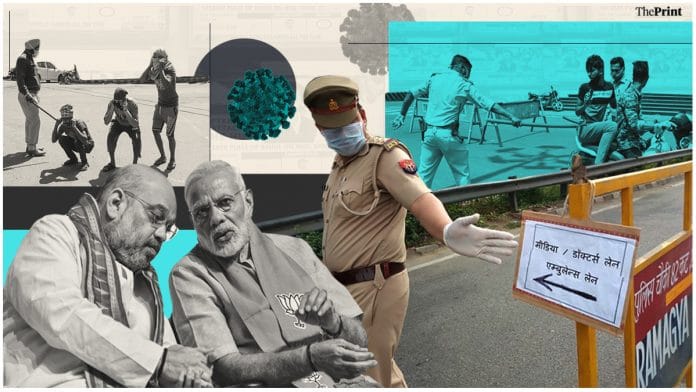The Supreme Court has directed the media to refer to and publish the “official” version of coronavirus-related developments while hearing a government plea to vet media coverage. Surveillance is becoming a key concern during the Covid-19 crisis. States such as Kerala and Telangana are already using CCTV footage and geotagging apps to track Covid-19 cases. Meanwhile Karnataka has proposed a smartphone app where those quarantined have to upload ‘selfies’ every hour. Delhi Police will also now track phones of those quarantined in the national capital.
ThePrint asks: Is there a risk of Modi govt using Covid-19 to curb media and freedoms or is it necessary?
We are paying the cost of govt’s lack of communication before lockdown with our freedom and rights
 Malavika Prasad
Malavika Prasad
Lawyer
Weaponising Article 32’s constitutional remedy for protecting our fundamental rights, the central government — in a petition ostensibly seeking to protect the rights of migrant labourers — asked the Supreme Court to restrict media freedoms. The government’s concerns, however, are based on some unsubstantiated assumptions: that the migrant workers’ exodus was caused by misinformation leading to ‘panic’, and that ‘electronic, print and social media — particularly web portals were responsible for such misinformation.
If there indeed was evidence of media houses panic-mongering – a crime under Section 54 of the Disaster Management Act, 2005 – such media houses could appropriately have been prosecuted. Yet, the court approved the government’s causal claims and directed media to publish the government’s “official version” of news related to the coronavirus pandemic.
One must ask whether some of the alleged ‘panic’ was caused because the entire slew of protections and clarifications for essential services, special protections against eviction, the PM Garib Kalyan Yojana were not announced with clarity, at the get-go.
This is the latest in a series of restrictions on our fundamental rights and freedoms – ranging from inaccessible PDS to holders of out-state ration-cards, having to upload hourly GPS-location-tagged selfies during home quarantine, to prohibitions on travel in two or four wheelers.
We have to ask if clear communication and instructions between the states and the Central government were ensured before issuing nationwide lockdown orders on 24 March, would we still have been paying the costs with our fundamental rights, freedoms, and lives?
Enough laws to punish those who indulge in rumour-mongering, pre-censorship not required
 Ishkaran Bhandari
Ishkaran Bhandari
Advocate
Media censorship is never a good idea in a democracy. The world is facing a huge crisis in the form of the coronavirus pandemic, which is a situation that can only be compared to a world war-like scenario. Everybody in the world is affected by it and everybody is trying to fight it together. There are instances of some people spreading panic, which can not only hamper this fight, but also lead to damage and loss of property and life. That is probably why the government is asking for censorship.
Censorship is of two types — pre and post. Post-censorship is when something is taken down after it has been posted because of its objectionable content. Pre-censorship is rarely ordered by the court. In a panic situation, the media acts responsibly, does not spread false information, and as far as possible, only reports the official version and death toll.
As of now, there should not be any pre-censorship because once it starts, it quickly becomes a slippery slope. We have to trust accredited Indian media, and wait and watch.
In case, there are very serious cases of rumour-mongering, there are enough laws dealing with post-censorship where they can be booked and punished, let us not start on the slippery slope of pre-censorship.
Geo-tagging is being used to track people with Covid-19. It is not an instrument of ‘surveillance state’
 Sangit Ragi
Sangit Ragi
Professor, Dept of Political Science, Delhi University
There is a thin line that distinguishes the personal from the public domain. The elements of personal freedom that may imperil the lives of others don’t fall strictly in the ‘self-regarding’ domain, and therefore limiting such elements of freedom for the common good of saving human lives from a contagious virus is essential.
The apprehension of some people that the Modi government may use Covid-19 crisis as an excuse to restrict personal liberty and media freedom is ill-founded. Media has been considered an essential service and kept out of the lockdown, as PM Modi emphatically said in his address to the nation.
As far as the use of geo-tagging based to track movements of people is concerned, it is not intended to work as a coercive surveillance state but to monitor the people who are possibly infected by the coronavirus and isolate them from the rest, while treating them. Had this technology not been use, it would have been impossible to track down nearly 1,600 people of the Tablighi Jamaat, who after attending the meet at Nizamuddin in Delhi dispersed to different states and villages in the country and went into hiding for the fear of quarantine and legal action. Ironically, in India, the intellectuals who oppose the use of such technologies, alleging that they are instruments of ‘surveillance state’, belong primarily to the Left ideology, the masters of which are known for the worst human rights violations in the world.
Media can use official figures for Covid-19, but can’t report only facts given by govt
 Sevanti Ninan
Sevanti Ninan
Media commentator and founder editor, TheHoot.org
The Narendra Modi government has sought to both co-opt the media and curb its reporting in its effort to contain negative Covid-19 coverage. First, with a video-conference before the lockdown announcement in which PM Modi urged media owners and editors to “act as a link between the government and the people” and by asking them to tackle “the spread of pessimism, negativity and rumour”.
Rigorous reporting of how a lockdown is panning out on the ground may sound negative and pessimistic to the PMO, but it is manifestly the media’s job to do it. Without their reporting, the mass migration of migrants may not have become the issue it did.
The government then sought a Supreme Court direction to contain media from reporting without ascertaining facts from the mechanism provided by the government. It is a fact that each day’s figures of deaths and positive cases are varying from one publication to another. So the government can ask that official figures must be carried. But it cannot ask the media to stick to government-given facts only.
And it is surprising that the Supreme Court is reported to have accepted the government’s claim that the mass movement of workers was the result of panic created by fake news. It was not. It was a result of the government announcement, unaccompanied by any simultaneous assurance of welfare measures. As the Committee to Protect Journalists (CPJ) has pointed out, it is the government’s job to contain the virus, not contain vital reporting.
Also read: Jails give Covid-19 parole: Can overstretched govt track prisoners’ movement and behaviour?
By Unnati Sharma, journalist, ThePrint







Sevanti says “But it cannot ask the media to stick to government-given facts only.” but haven’t given an example of what are the other sources of facts on Corona status in India. Can it be a mathematical model churning propaganda figures as facts? or a BBC reports based on half truths. If media can avoid the anti government propaganda, nobody has problems with the alternate sources of facts and only facts and not propaganda.
Conduct of SC has been a very big disappointment.
Ha ha, afraid of your empire coming under threat ?
The media observes responsibility and restraint while reporting sensitive issues, in India and all over the world. Especially in times of war, which this pandemic in some senses is. India’s journalists have a fine, seventy year record of giving us world class reporting, despite the vast gulf in the resources it possesses in comparison to the West. 2. What causes concern in fact is the swathe of media that has become an echo chamber. Amplifying spin. Often spreading a toxic message of communalism and jingoism. Not above propagating fake news. Allowing lapses in governance to go unquestioned.